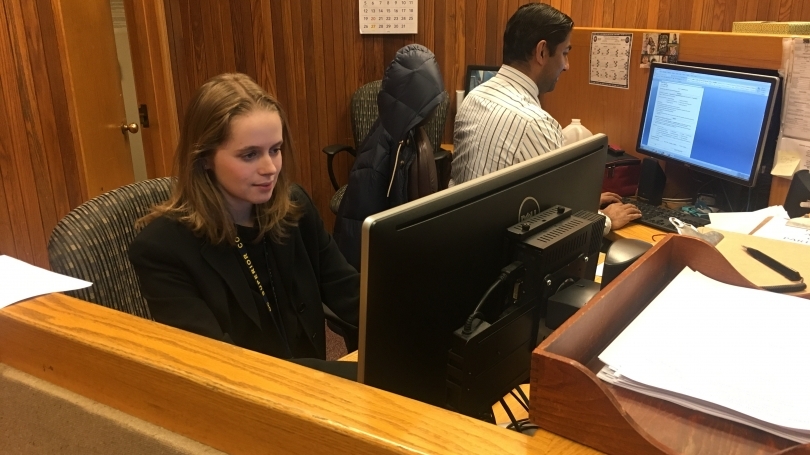
- Public Policy
- Leadership
- Funding
- News & Events
- About the Center
Back to Top Nav
Back to Top Nav
Back to Top Nav
Back to Top Nav
Louisa Auerbach '20 interned as a Judicial Intern in the chambers of the Honorable Lynn Leibovitz of the D.C. Superior Court during the 2019 winter term. The following is an excerpt from her internship report.
For the Winter Term of 2018, I worked as a Judicial Intern in the chambers of the Honorable Lynn Leibovitz of the D.C. Superior Court (DCSC). DCSC is the trial court for the District of Columbia, handling everything from civil disputes to the highest level felonies. Judge Leibovitz, for whom I worked, was handling a Juvenile caseload at the time of my internship. Having been on the Court since 2001, however, she has experience in many legal realms and was previously the Presiding Judge of Criminal Court. Judge Leibovitz’s extensive experience was integral in shaping my internship as I was able to work on a vast range of cases, seeing post conviction motions and orders from felony cases, domestic relations trials, juvenile proceedings, and even some criminal hearings. For these cases I did pre-hearing and pre-trial case prep and drafted adoption orders, post-conviction orders, and reviewed motions in every genre. I also acted as an assistant to the courtroom clerk during proceedings, helping check in attorneys, passing out paperwork, and locating and helping all parties.
Working at the Court I began to understand that for most families, the court is not a place of justice, it is a place of fear and punishment. I was inspired by my warrior-like colleagues and the passion they exhibited. The work, however, was often hard to swallow. By talking with the Judge and other people in my chambers, I was able to develop a thicker skin without becoming numb to the issues at hand. Furthermore, I absolutely loved my time at the Superior Court for a myriad of reasons. Firstly, Judge Leibovitz’s chambers was my first experience in an all-female workplace. To see powerful women exhibiting uninhibited confidence was inspiring. Secondly, everyone in my workplace was willing to let me try tasks that were more and more challenging without fear of failure. For example, with some help and many questions, I was able to execute a draft of a post-conviction order in a criminal case! Finally, spending every day in court allowed me to become well acquainted with all the moving parts of a criminal, or juvenile, case. Exposure to the countless factors, from the crime itself to the role of the defense attorney to the nature of commitment in DC opened my eyes to the many ways in which public policy is both felt and enacted.
Being in the courtroom everyday, I was able to see consistent examples of defensive attorneys and prosecutors at work. Viewing all of this from a Judge’s perspective, or at least from Chambers, revealed so much about the criminal justice system in DC and America as a whole. I intend to use the knowledge and experiences I gleaned from working with Judge Leibovitz in the entirety of my education and career path. As I aspire to a career in criminal law, this experience will influence any direction within the field I take, and the problems along the way I might hope to tackle. My grant from the Rockefeller Center not only made my internship possible but enjoyable and largely stress-free. I am incredibly thankful for not only the funds awarded but also by the consistent care and assistance that Eric and the Center have extended to me.
The Rockefeller Internships Program has funding for Dartmouth undergraduate students to help defray the cost of living expenses associated with a full-time, unpaid, leave-term internships in the fields of public policy, public affairs, and social entrepreneurship.